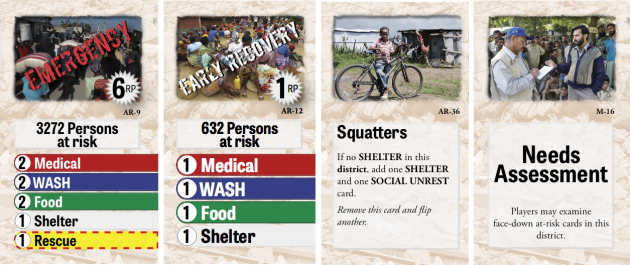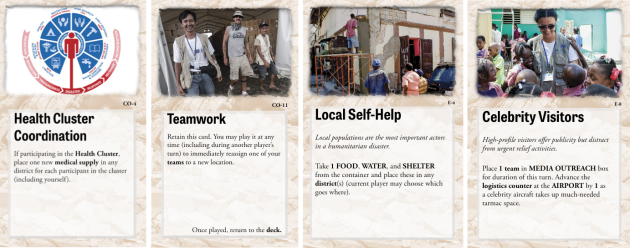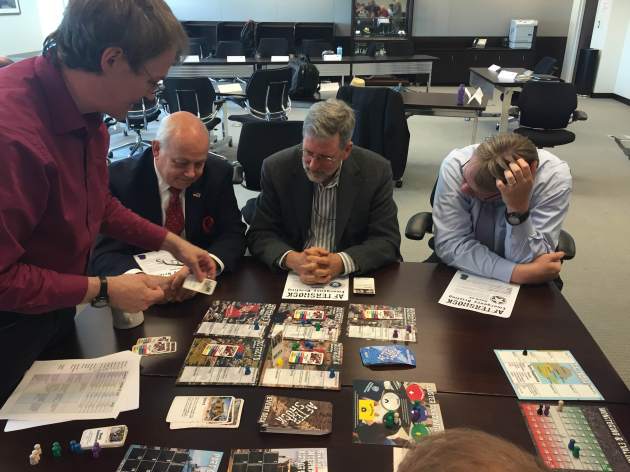
PAXsims is devoted to peace, conflict, humanitarian, and development simulations and serious games for education, training, and policy analysis.
If you wish to be notified when new material is posted here, use the “subscribe by email” option below.
Relevant comments are welcomed.
PAXsims operates on a non-profit basis. You can donate to support our activities via Patreon: https://www.patreon.com/PAXsims
Join 3,521 other subscribers
Recent Posts
- GPPI: Gaming the Political Economy of Conflict
- Wargamer Job at NDU
- Registration for Connections US 2024 now open
- Connections UK 2024
- All that’s left is the grading…
- Wargaming the effects of a Trump presidency on NATO
- Journal of Defense Modeling and Simulation (April 2024)
- We Are Coming, Nineveh nominated for Charles S. Roberts Awards
- Assises Françaises d’Étude du Wargaming (29-30 April)
- PPCLI QUICK Jr
Top Posts
Categories
- call for papers
- conferences
- courses
- crowd-sourcing
- forthcoming games and simulations
- gaming vignettes
- job opportunities/positions vacant
- latest links
- methodology
- not-so-serious
- playtesters needed
- reader survey
- request for proposals
- scholarships and fellowships
- simulation and game reports
- simulation and game reviews
- simulation and gaming debacles
- simulation and gaming history
- simulation and gaming ideas
- simulation and gaming journals
- simulation and gaming materials
- simulation and gaming miscellany
- simulation and gaming news
- simulation and gaming publications
- simulation and gaming software
Archives
| M | T | W | T | F | S | S |
|---|---|---|---|---|---|---|
| 1 | 2 | 3 | 4 | 5 | ||
| 6 | 7 | 8 | 9 | 10 | 11 | 12 |
| 13 | 14 | 15 | 16 | 17 | 18 | 19 |
| 20 | 21 | 22 | 23 | 24 | 25 | 26 |
| 27 | 28 | 29 | 30 | 31 | ||
Associations
- Australian Defence Force Wargaming Group
- Connections Netherlands
- Connections North (Canada)
- Connections Oz (Australiasia)
- Connections UK
- Connections US
- Georgetown University Wargaming Society
- International Game Developers Association
- International Simulation and Gaming Association
- MORS Wargaming Community of Practice
- North American Simulation and Gaming Association
- SAGSET
- Serious Games Network – France
- Simulations Interoperability Standards Organization
- UK Fight Club
- USA Fight Club Wargaming Group
- Women's Wargaming Network
- Zenobia Award
Institutions (public and commercial)
- Advanced Disaster, Emergency and Rapid Response Simulation
- Booz Allen Hamilton—experiential analytics
- BreakAway—serious games
- Brian Train-game designs
- Civic Mirror
- CNAS Gaming Lab
- ConSimWorld
- Decisive Point
- Fabulsi—online roleplay simulations
- Fiery Dragon Productions
- Fletcher School/Tufts University—SIMULEX
- Fort Circle Games
- GamePolitics
- History of Wargaming Project
- Imaginetic
- Kings College London—Kings Wargaming Network
- LBS – Professional Wargaming
- LECMgt
- McGill Model UN
- MCS Group
- MegaGame Makers
- MODSIM World conference
- Naval Postgraduate School—MOVES Institute
- NDU—Center for Applied Strategic Learning
- Nusbacher & Associates
- Nuts! Publishing
- Peacemaker Game
- Persuasive Games
- PlanPolitik
- RAND Center for Gaming
- Serious Games Interactive
- Slitherine Software
- Statecraft
- Stone Paper Scissors
- Strategy and Tactics Press
- Track4
- Utrecht Institute for Crisis and Conflict Simulation
- Valens Global
- Wargaming Connection
- Wikistrat blog
- World Peace Game Foundation
Journals and Publications
- Battles Magazine
- C3i Magazine
- Eludamos: Journal of Computer Game Culture
- GAME: The Italian Journal of Game Studies
- International Journal of Gaming and Computer-Mediated Simulations
- International Journal of Role-Playing
- Military Training & Simulation
- Sciences du jeu
- Simulation & Gaming
- The Journal of Defense Modeling and Simulation
- Training & Simulation Journal
- Virtual Training & Simulation News
Simulations and Games
- Active Learning in Political Science
- Barnard College—Reacting to the Past
- Best Delegate
- Beyond Intractability—Exercises and Simulations
- BoardGameGeek
- Class Wargames
- Columbia American History Online—classroom simulations
- Community Organizing Toolkit—game
- ConSimWorld
- CRISP: Crisis Simulation for Peace
- CUNY Games Network
- Darfur is Dying—game
- Economics Network—classroom experiments and games
- Emergency Capacity Building project — simulation resources
- EuroWarGames
- Game Design Concepts
- Game Theory .net
- Gameful
- Games & Social Networks in Education
- Games for Change
- GeoGame
- Giant Battling Robots
- Global Justice Game
- Grog News
- Guns, Dice, Butter
- Ian Bogost
- ICT for Peacebuilding
- Journal of Virtual Worlds Research
- Little Wars
- Ludic Futurism
- Ludology
- Mike Cosgrove—wargame design class
- MIT-Harvard Public Disputes Program—simulation materials
- MSSV
- National Center for Simulation
- National Security Decision-Making game
- No Game Survives…
- North American Simulation and Gaming Association
- Oil Shockwave Simulation
- Pax Warrior
- Pervasive Games: Theory and Design
- Play the Past
- Play Think Learn
- Purple Pawn
- Serious Games at Work
- Serious Games Network France
- Strategikon (French)
- Technoculture, Art, and Games
- Terra Nova (Simulation + Society + Play)
- The Cove: Wargaming
- The Forge Wargaming Series
- The Ludologist
- The Open-Ended Machine
- Tiltfactor
- Tom Mouat's wargames page
- Trans-Atlantic Consortium for European Union Studies & Simulations
- United States Institute for Peace—Simulations
- University of Maryland—ICONS Project
- US Army—Modelling and Simulation
- USC—Institute for Creative Technologies
- Wargame_[space]
- Web Grognards
- Zones of Influence
















Hello Rex and Thomas. Have you considered creating or working with someone to create an online asynchronous version of this FANTASTIC game? Ping me back at brian@steckler.com to discuss ideas how to do this if of interest (I’m not trying to sell anything or generate work….am gainfully employed….but have a long background in disaster communications). Tks – Brian
Will you be at the Connections wargaming conference at KCL next month? If so, we can talk there (and I’ll run an AFTERSHOCK game too). Let me know by email: rex.brynen@mcgill.ca
@Rex: Thank you so much for the reply, I’ll definitely get a copy of both the game and the expansion. I’m teaching a course on Intelligence Ethics this semester and I have been looking far and wide for any sort of game/simulation/system that either already has or allows for moral/ethical dilemmas to be part of the decision-making process. If any other materials come to mind, all recommendations are welcome!
If you do decide to do an “Ethical Dilemmas in Humanitarian Aid” expansion, I’ll gladly offer any assistance you may need. I’m a graduate of the War Studies programme at King’s College London and Professor Philip Sabin always spoke very highly of you, it’d be a pleasure!
Karim: Aid prioritization presents ethical/triage dilemmas throughout the game, and a few are also presented in the event cards. The “Gender Expansion” adds a lot more, because at times you have to make trade-offs between longer-term vs shorter-term goals. The game also comes with blank cards to allow customization, if there are particular dilemmas one wishes to insert.
It would be interesting to do an “Ethical Dilemmas in Humanitarian Aid” expansion at some point, and quite easy to do so using our system for game expansions. However, I have to find the time (or sponsor) first…
Are there any moral/ethical dilemmas that players are presented within the mechanics of Aftershock?
I’m sorry your group encountered some rules confusion. While that isn’t something we’ve run into before, we’re always happy to help out! You can email me any rules queries (rex.brynen@mcgill.ca), or raise them at BoardGameGeek.
Steve: You’re correct. The last line of the box should read “Carana loses one team as per the event.”
In the rulebook v5.0.2, page 6, the event card E-9 example box at the bottom, last sentence reads, “Further, Carana loses 1OP for the event.” Shouldn’t this read “team” instead of “OP”? Yes, both Carana and NGO each lose 1 OP due to the needs not being met which is stated in the prior paragraph. But the example doesn’t acknowledge the “needs not met” statement on the event card. That said, the paragraph at the top of the page, 2nd column, does reference this correctly.
We would usually be looking for a description of the course (including other elements), a brief summary of how the game was conducted and what happened, then some discussion of learning outcomes, etc. On another note, have you seen the gender supplement to the game? It would be quite easy to develop a logistics supplement using the same mechanism.
Just to add to my previous comment.. in addition to the boardgame, I use a dynamic case which I developed myself and published, see the following link: http://www.emeraldinsight.com/doi/abs/10.1108/20450621211284642
I also do research in the area of humanitarian logistics, here is a link to our recently published paper in Journal of Operations Management: http://www.sciencedirect.com/science/article/pii/S0272696316300444
Thank you very much for clarifications. I teach a course in Humanitarian Logistics at Lund University (advanced/master level) within a specialization of logistics and supply chain management. Could you perhaps elaborate what constitutes a game session write-up, I’d be happy to help out. Best regards // Joakim
1. An infrastructure token counts as one item for the purposes of port/airport capacity, regardless of how much a player “paid” for it.
2. There is no total capacity limit, and as you correctly note the logistics counters reset at the end of each game turn (not player turn). This means that it is the UN and especially the NGO player who may face problems bringing in material (Carana doesn’t have to worry about the restrictions, while HADR-TF moves early and so the port and airport are never full yet). This was a deliberate design decision: in Haiti, military then UN flights were given priority, while NGOs often complained they couldn’t get landing slots.
If your HADR-TF player is aggressively upgrading logistics infrastructure early in the game, this probably means that either i) they’re gamers and foresee the potential bottleneck problem, or 2) they understand the importance of logistics in humanitarian operations. Many players will, unless prompted, focus on supplies, fill the port and airport, and then have overflow at the frontier. In this sense the game is very much about highlighting the importance of proper planning rather than simply throwing bottles of water to orphans.
Any chance of a game session write-up for PAXsims on your classroom use of AFTERSHOCK? What class are you using it for?
Thanks for a quick reply, and I believe your comments make sense. I then have two follow-up questions that are related to the ports and capacity constraints.
1. If a player decides to transform supplies (3 similar or 3 different) to an infrastructure marker, does that infrastructure marker count as 1 or as 3 in the port/airport?
2. For the respective local warehouses in the port/airport, is there any overall capacity limit? If I understood correctly, the logistics capacity constraint in the port/airport only applies to all new supplies brought in during one round. The next round, the players can bring in equally as much, or?
Generally it makes more sense to upgrade the Airport, at least initially (and indeed this what was done in the Haiti earthquake).
The Port does have some advantages, though: it ultimately can accept more incoming material, AND Carana has a warehouse there. That means players who bring in material at the Port can, if they are in the appropriate Cluster meeting with Carana, then pass on materials to Carana to distribute. Since Carana has the special ability to deliver one supply per district regardless of whether it has a team is located there, this can be quite effective.
By contrast, Carana does not have a warehouse at the Airport, and so supplies there cannot be shared with it (even if you’re in a Cluster meeting together).
If players aggressively upgrade either the Port or Airport they should be OK. Remember, however, that to upgraded you need to: 1) buy the upgrade, and count it against incoming capacity for that turn, 2) next turn, have a team allocated to the Logistics cluster, and then perform the upgrade in the Special Operations phase of that turn. It thus takes a while and is resource intensive.
Hi, I am just introducing Aftershock in my course and have one important question related to capacity constraints in the Airport/port (which kind of defines the game and purpose to show how important logistics is). It appears as if upgrading the Airport is much more favorable than upgrading the port. When we played the game we just upgraded the Airport and never had any issues with logistics/constraints to bring in supplies. We feel that we have missed something and would appreciate some guidance.
Not yet, no. Time permitting we may video a couple of turns at some point.
Are there any videos of a complete game being played. I have read the rule book, but it would be nice to see how it all flows before attempting to play.
The conversion takes place BEFORE the supplies/infrastructure “arrives.” An infrastructure marker still only counts as one item, therefore you are able to bring one into the port despite its initially heavily-damaged state.
I have a rules Question about the game. Three newly arrived supplies are used to convert to a infrastructure counter. Does this conversion take place before or AFTER the supplies are brought in via the airport or seaport? If conversion AFTER the supplies are landed the seaport’s initial status of 1 supply prevents it being repaired by international aid. Is the intent to prevent any but the local government to perform this initial upgrade to the seaport? This is a key factor as the seaport is the only point that all parties warehouses are available for sharing.